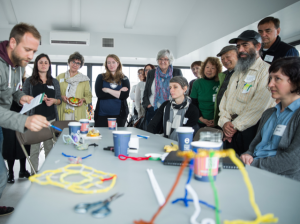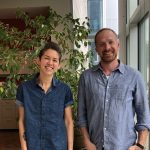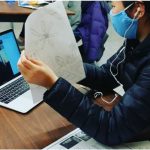Written by Katie Forman, Student Learning Coordinator, UBC Learning Exchange, May 2019
In my previous post, I discussed the importance of exploring the logistical considerations for very busy students and the community partners they will be working with. Logistical constraints can present a challenge, but when carefully considered, they can make for a more meaningful experience.
Let’s take the example of our work at the Learning Exchange in hosting UBC students from the Faculty of Pharmaceutical Sciences’ as part of their Community Service Learning class. For the past few years, the intention of this class has been to provide opportunities for pharmacy students to experience community settings before practicing as pharmacists in communities of their own. Students are placed in neighbourhood houses, retirement residences, schools, community centres, etc.

At the Learning Exchange, we ask our pharmacy students to run conversation sessions on health topics for seniors learning English as part of our Seniors Thrive program. The students are able to work with a relevant population[1] in a relevant way. Students educate patients and practice their communication skills — two of the competencies pharmacy students must learn. For seniors we’ve learned that practicing English with younger generations is valuable, talking about their health care experiences is validating, and they appreciate educating future professionals. While there are clearly many benefits, this arrangement was arrived at after addressing many logistical considerations:
- The placements are organized by UBC Pharmacy’s Office of Experiential Education, and many of the details are arranged prior to the students’ involvement.
- The Pharmacy students have no other classes on Thursday afternoons, so they can use this time to attend their volunteer placements.
- Community partners are given a package at the beginning of the academic year with dates, deadlines, and reporting requirements attached to the placement. So they know what to expect.
- Students attend lectures where Pharmacy instructors help them connect their experiences to the curriculum.
- Community partners are given flexibility in what students can do during their placement. Students can take on special tasks as we ask them to do at the LE or join the ranks of other volunteers to assist with the community partners’ routine tasks like meal prep, arts and leisure activities, etc.
Our decision to have pharmacy students facilitate conversation sessions arose from another constraint: students only work in their community placements for 20 hours. For many community organizations, this is a very short period of time. We’ve found that strong relationships are necessary in our community programs, which is hard to achieve for students new to the community who have only 20 hours to share.
One way around this limitation is to have each group of Pharmacy students build on the work of the last group. If their placement starts when our conversation sessions aren’t running, they’ll update lesson plans that the last group developed and pilot them once the term starts. If they begin their placement in the middle of a conversation session term they may deliver health sessions right away or pop in to other sessions to ask seniors about new topics of interest. In this way we can map the students’ limited availability onto the structure of the program to the maximum benefit of both.
A program’s logistics may foreclose some possibilities but open up others in unforeseen ways. Creativity and flexibility are therefore important practices in community-engaged learning.
[1] According to the Canadian Institute for Health Information in 2016 seniors accounted for 17% of the Canadian population but were responsible for 40% of spending on prescribed drugs. (https://www.cihi.ca/sites/default/files/document/drug-use-among-seniors-2016-en-web.pdf)







